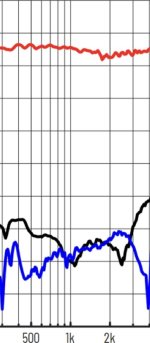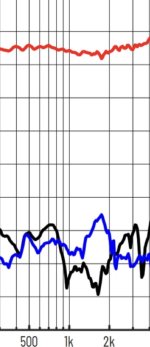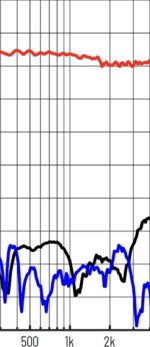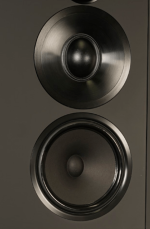has anyone tried horn loading their mid dome in a similar fashion to the atc or volt ones ? I'm about to try using a 1.5inch roundover bit on the router to see what happens . Still not happy with my circle cutting and am struggling to find a circle jig that will cut small enough circles for the tweeters as well as mid domes . drill for scale !
Attachments
A dome has lower directivity/wider dispersion than a cone.
The dispersion of a 3” dome is similar to 2” cones.
But a dome tend to have lower excursion and thus lower output in the lower ranges. Wave-guiding them will enable slightly more output at the lower ranges with the side effect of high directivity.
Unless a 3” dome has an outer frame of 3-4”, and at least 1mm x-max; it has rather niche applications.
I wonder whether 3” mid domes have been supplanted with the rise of modern 2” full rangers with powerful neo magnets and long throw suspensions.
The dispersion of a 3” dome is similar to 2” cones.
But a dome tend to have lower excursion and thus lower output in the lower ranges. Wave-guiding them will enable slightly more output at the lower ranges with the side effect of high directivity.
Unless a 3” dome has an outer frame of 3-4”, and at least 1mm x-max; it has rather niche applications.
I wonder whether 3” mid domes have been supplanted with the rise of modern 2” full rangers with powerful neo magnets and long throw suspensions.
JBL seemed to use, what looks like compression driver domes as direct radiators in this speaker (and in a couple of more models listed down in the article)
https://audio-database.com/JBL/speaker/xpl200.html
https://audio-database.com/JBL/speaker/xpl200.html
For those of who have used, or heard, both...is the HiVi DMB-A outright better than the Dayton RS52F or just better "for the money"? I have the Dayton's on the shelf but if the HiVi's outright sound better I'm going to change directions. (Exact crossover points may differ but doesn't matter, I'll pick woofer and tweeter to match the chosen dome mid.)
Member
Joined 2003
Disagree, the dispersion of a 2" dome is similar to a 3" cone. Of the handful of drivers I tested in the same cabinet, same location, two were 2" domes, The peerless above as well as Morel EM1308. Both these domes match the dispersion pattern of a TG9 when equalized for the same response. Wavecor WF120 is every slightly more directional at 4" size, but not really enough to care about.A dome has lower directivity/wider dispersion than a cone.
The dispersion of a 3” dome is similar to 2” cones.
Member
Joined 2003
Member
Joined 2003
Reid,
If what you’re saying is true (and it probably is) then why does one need a 3” dome?
There are plenty of readily available 4” cones that play from 300Hz to almost 4Khz. No shortage of sensitivity or excursion options either.
BR,
Thanh
If what you’re saying is true (and it probably is) then why does one need a 3” dome?
There are plenty of readily available 4” cones that play from 300Hz to almost 4Khz. No shortage of sensitivity or excursion options either.
BR,
Thanh
Member
Joined 2003
I am thinking the same thing...One possibility is higher sensitivity, larger voice coil for lower compression at high SPL. Something crazy like Bliesma might make sense for some people, but I think loudspeaker manufacturers could focus on making more dedicated high sensitivity midrange drivers period. For most people like myself who are building home hi-fi, I think Wavecor WF120 is a great option.why does one need a 3” dome?
If what you’re saying is true (and it probably is) then why does one need a 3” dome?
From HFC review of Bliesma domes
What then is the advantage of domes over cones and is there one? The advantage lies in the lower inertia of the moving system due to 2-3 times less weight, and in a higher efficiency. In order to achieve the same volume level as BlieSMa domes, the aforementioned cones must be supplied with 6-10 times more power. At low volumes, this is imperceptible, but at high SPL, thermal compression of low-efficiency speakers becomes noticeable. With its high sensitivity, the M74x-6 can be the heart of a loudspeaker capable of reproducing the realistic levels of a symphony orchestra in a room up to 20m2, even when using a low power 5-6 W triode amplifier.
I'm not sure if that's it for me, perhaps partly. I hear a unique naturalness and clarity in the e.g. ATC domes that simply appeals. Acceleration factor? Can't put my finger on it.
I get Yevgeniy’s point on this, as he compares to available midwoofers, however none of the following drivers…
Seas W12CY006, Scan-Speak 12MU/4731T00, Wavecor WF120BD03, VIFA NE123W-08 …
are pure midranges.
A 4” pure midrange- with a shortened coil in a small gap. the a smaller voice coil, and replace the rubber surround with a thin fabric or foam surround for x-max of 1mm instead of 4-8mm and a 4” pure midrange can easily achieve 90+ dB/2.83V.
Seas W12CY006, Scan-Speak 12MU/4731T00, Wavecor WF120BD03, VIFA NE123W-08 …
are pure midranges.
A 4” pure midrange- with a shortened coil in a small gap. the a smaller voice coil, and replace the rubber surround with a thin fabric or foam surround for x-max of 1mm instead of 4-8mm and a 4” pure midrange can easily achieve 90+ dB/2.83V.
is it that the dome midrange doesn't have any breakup is it correct to say that all cone drovers have some kind of breakup at the top of their range ? I've always wanted a dome midrange because I thought they must be superior if atc are using them . if there not which cone driver should i be using if I want the best midrange say 300 to 3000??
I’m with @PKAudio
As for whether higher sensitivity matters or not?
Well given the same SPL; it’s not clear that the higher sensitivity driver necessarily has the better performance. At least for well designed drivers.
Purifi PTT4.0 drivers; 4” drivers, actual cone diameter 3.33”. Outer frame diameter 5”.
Purifi PTT4.0M aluminium 4” midwoofer with small 2.9mm x-max and 86dB sensitivity
Vs
Purifi PTT4.0M paper/fibre 4” driver with same 2.9mm x-max and 87dB sensitivity
Vs
Purifi PTT4.0X aluminium 4” woofer with large 8.8mm x-max and 84dB sensitivity
Here are measured at @94dB SPL; images cropped to focus on “midrange” frequencies between 300Hz and 4KHz:



Fundamental red, H2 black H3 blue. Each large square represents 10dB.
As for whether higher sensitivity matters or not?
Well given the same SPL; it’s not clear that the higher sensitivity driver necessarily has the better performance. At least for well designed drivers.
Purifi PTT4.0 drivers; 4” drivers, actual cone diameter 3.33”. Outer frame diameter 5”.
Purifi PTT4.0M aluminium 4” midwoofer with small 2.9mm x-max and 86dB sensitivity
Vs
Purifi PTT4.0M paper/fibre 4” driver with same 2.9mm x-max and 87dB sensitivity
Vs
Purifi PTT4.0X aluminium 4” woofer with large 8.8mm x-max and 84dB sensitivity
Here are measured at @94dB SPL; images cropped to focus on “midrange” frequencies between 300Hz and 4KHz:



Fundamental red, H2 black H3 blue. Each large square represents 10dB.
Last edited:
The biggest issue (for me) with small cone drivers is the power handling of the typically small VC and the power compression. If I'm going through the hassle of building a 3 way with a decent size LF driver, i want the benefits of higher output and dynamic range. A 3/4 - 1" VC cone mid won't keep up with an LF driver which has a huge VC in a properly tuned enclosure. I dont see more than 15W continues power handling with a 3/4" VC, which isn't much better than your average 1" dome tweeter. A 2" plus dome mid can easily take 50W long term and a 3" can deal with upwards of 80W. if it has a decently designed VC and the appropriate HP filter, your typical larger mid dome is excursion limited before max power is dealt with.
And then venerable Vifa Tc/Tg driver shows up again in discussions about audio on paper…….take a tg9 and a 2” dome and AB audition them within the same passband…….this shouldn’t really be a question.
Folks have tried and there‘s been both success and failures…..the horn loading provided by the waveguide will add compression to the dome itself so the dome material and suspension have to be able to take it….if not, the results are typically rocking modes and other response anomolies……a fair tradeoff for some who need the deeper extension and lower distortion the waveguide provides acoustically.has anyone tried horn loading their mid dome in a similar fashion to the atc or volt ones ? I'm about to try using a 1.5inch roundover bit on the router to see what happens . Still not happy with my circle cutting and am struggling to find a circle jig that will cut small enough circles for the tweeters as well as mid domes . drill for scale !
thanks they do look impressive don't theyjccart: 12MU
- Home
- Loudspeakers
- Multi-Way
- The dome midrange thread

